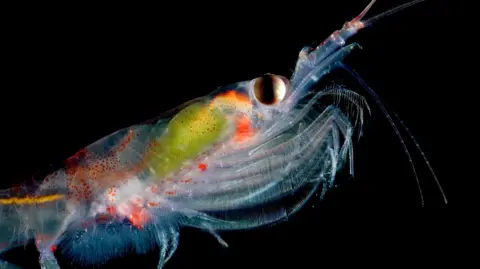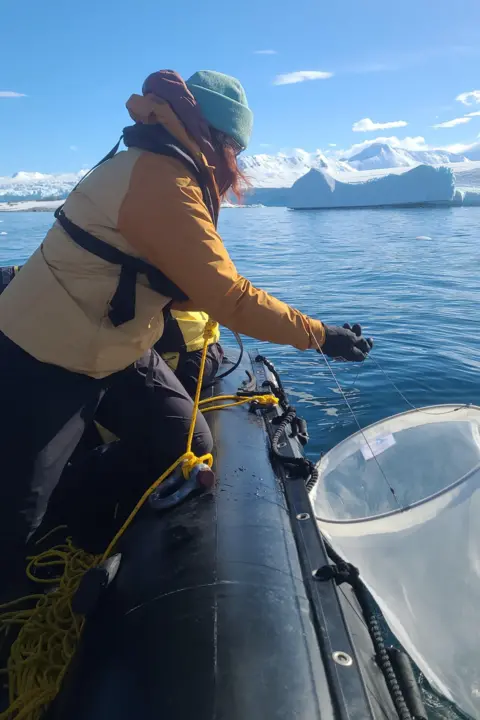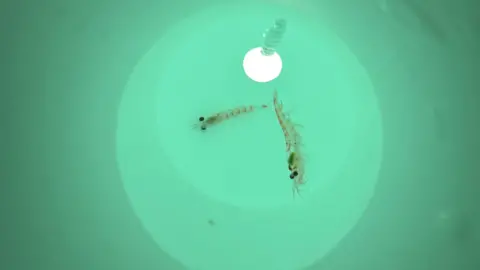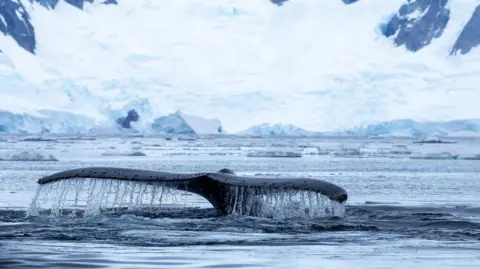AI Research
Why scientists are counting tiny Antarctic krill from Space

Science correspondent, BBC News
 WWF
WWFScientists say subtle differences in the colour of seawater will enable them to count tiny – but critically important – Antarctic marine creatures, from Space.
The target of the new research effort is Antarctic krill, which are just a couple of inches long and one of the most abundant and important animals on the planet.
Marine wildlife – including whales, penguins, seals and seabirds – all feed on these diminutive creatures.
However, conservation scientists are concerned that fishing and climate change could be having a negative impact on them and say we need new ways to monitor the creatures.
 WWF
WWF“Antarctic krill are the superheroes of the Southern Ocean,” said Rod Downie, chief polar adviser at the wildlife charity WWF-UK.
“They are tiny, unsung heroes that sustain incredible marine life, but climate change and unsustainable fishing are putting them at risk.”
Researchers from the University of Strathclyde, WWF and the British Antarctic Survey (BAS) are developing a new way to use satellites to work out how many krill are in the ocean around Antarctica.
 WWF
WWFThe key is in subtle differences in how much light seawater absorbs – depending on how many krill are swimming in it.
Dr Cait McCarry, from the University of Strathclyde, has just returned from a trip to Antarctica, where she caught krill in order to measure this effect.
“We start with seawater, then we add in a krill and take a measurement [of how much light the water absorbs],” she explained. “Then we add another krill and take another measurement.”
This analysis of exactly how the density of krill alters the colour of the ocean will, researchers say, allow them to take snapshots of the krill population from satellites – monitoring the population from Space.
 Victoria Gill/BBC
Victoria Gill/BBCKrill are food for some of the largest animals on the planet – including giant whales that migrate thousands of kilometres, to Antarctica, to feed on them.
They are also the foundation of a healthy ocean – part of a virtuous cycle: Whales eat krill, krill eat microscopic plants that live in sea ice, and those plants absorb planet-warming carbon as they grow. When whales poop (in vast quantities), that fertilises the planet-cooling marine plants.
However, as the ocean temperatures rise with global warming, conservation scientists are concerned that this cycle could be disrupted, and that krill could be vulnerable.
Mr Downie said: “We urgently need to better manage the fishery and protect krill habitats within a network of marine protected areas.
“[This project could] give us a new tool to help monitor and safeguard this vital species.”
AI Research
University Of Utah Teams With HPE, NVIDIA To Boost AI Research

The University of Utah (the U) is planning to join forces with two powerhouse tech firms to accelerate research and discovery using artificial intelligence (AI). The agreement with Hewlett Packard Enterprise (HPE) and AI chipmaker NVIDIA will amplify the U’s capacity for understanding cancer, Alzheimer’s disease, mental health, and genetics. The initiative is projected to enable medical breakthroughs, driving innovation, and scientific discovery across disciplines.
“The U has a proud legacy of pioneering technological breakthroughs,” said Taylor Randall, president of the University of Utah. “Our goal is to make the state awash in computing power by building a robust AI ecosystem benefiting our entire system of higher education, driving research to find new cures, and igniting Utah’s entrepreneurial spirit.”
The partnership, which includes a $50 million investment of funds from both public and philanthropic sources, is projected to increase the U’s computing capacity 3.5-fold. The flagship school’s Board of Trustees gave preliminary approval to the proposed arrangement on September 9.
The structure paves a path for substantial advances in computing storage and infrastructure required for Utah-based projects in AI and innovation. The goal is to lay the foundation for a scalable AI ecosystem available to researchers, learners, and entrepreneurs across Utah. The multi-year initiative would build upon existing capabilities in AI, giving the U access to substantially more computing power.
Brynn and Peter Huntsman along with the Huntsman Family Foundation will provide a lead philanthropic gift to the U that is intended to initiate the project and help encourage other supporters to make investments required to move the work forward through AI “supercomputer” systems designed to handle enormous processing and storage needs. The university will seek remaining funds from the state of Utah and other sources.
“This AI initiative will accelerate world class cancer research that enhances capabilities in ways we hardly imagined just a few years ago,” said Peter Huntsman, CEO and chairman, Huntsman Cancer Foundation. “Huntsman Cancer Foundation recently announced our commitment to support the expansion of the educational, research, and clinical care capacity of the world renown Huntsman Cancer Institute in Vineyard, Utah, which will serve as a hub for cancer AI research. These investments will speed discoveries and enhance the state of Utah’s leadership in AI education and economic opportunity.”
Mental health will be a major focus of the AI research endeavor.
“As the Huntsman Mental Health Institute opens its new 185,000-square-foot Translational Research Building this coming year, we’re looking forward to increasing momentum around mental health research, including the impact of this technology,” said Christena Huntsman Durham, Huntsman Mental Health Foundation CEO and co-chair. “We know so many people are struggling with mental health challenges; we’re thrilled we will be able to move even faster to get help to those who need it most.”
Check out all the latest news related to Utah economic development, corporate relocation, corporate expansion and site selection.
AI Research
F5 to acquire AI security firm CalypsoAI for $180 million

F5, a Seattle-based application delivery and security company, announced Thursday it will acquire Dublin-based CalypsoAI for $180 million in cash, highlighting the mounting security challenges enterprises face as they rapidly integrate artificial intelligence into their operations.
The acquisition comes as companies across industries rush to deploy generative AI systems while grappling with new categories of cybersecurity threats that traditional security tools struggle to address. CalypsoAI, founded in 2018, specializes in protecting AI systems against emerging attack methods, including prompt injection and jailbreak attacks.
“AI is redefining enterprise architecture and the attack surface companies must defend,” said François Locoh-Donou, F5’s president and CEO. The company plans to integrate CalypsoAI’s capabilities into its Application Delivery and Security Platform to create what it describes as a comprehensive AI security solution.
Companies are embedding AI into products and operations at an unprecedented pace, but this rapid adoption has created compliance gaps and heightened regulatory scrutiny. CalypsoAI addresses these challenges through what the company calls “model-agnostic” security, providing protection regardless of which AI models or cloud providers enterprises use.
The platform conducts automated red-team testing against thousands of attack scenarios monthly, generating risk assessments and implementing real-time guardrails to prevent data leakage and policy violations.
“Enterprises want to move fast with AI while reducing the risk of data leaks, unsafe outputs, or compliance failures,” said CalypsoAI CEO Donnchadh Casey. The company’s approach focuses on the inference layer where AI models process requests, rather than securing the models themselves.
The acquisition comes during a flurry of similar moves by established companies in the cybersecurity space that are looking to add AI-powered offerings to their customers.
F5 has also been active this year with what it considers strategic purchases. The company acquired San Francisco-based Fletch in June and observability firm MantisNet in August, demonstrating a pattern of building capabilities through acquisition rather than internal development.
The deal is expected to close by Sept. 30.
AI Research
Nebius Raises $3.7 Billion in Wake of Microsoft AI Deal

Dutch cloud computing company Nebius has raised $3.75 million via sales of stock and convertible notes.
-

 Business2 weeks ago
Business2 weeks agoThe Guardian view on Trump and the Fed: independence is no substitute for accountability | Editorial
-
Tools & Platforms1 month ago
Building Trust in Military AI Starts with Opening the Black Box – War on the Rocks
-

 Ethics & Policy2 months ago
Ethics & Policy2 months agoSDAIA Supports Saudi Arabia’s Leadership in Shaping Global AI Ethics, Policy, and Research – وكالة الأنباء السعودية
-

 Events & Conferences4 months ago
Events & Conferences4 months agoJourney to 1000 models: Scaling Instagram’s recommendation system
-

 Jobs & Careers2 months ago
Jobs & Careers2 months agoMumbai-based Perplexity Alternative Has 60k+ Users Without Funding
-

 Podcasts & Talks2 months ago
Podcasts & Talks2 months agoHappy 4th of July! 🎆 Made with Veo 3 in Gemini
-

 Education2 months ago
Education2 months agoVEX Robotics launches AI-powered classroom robotics system
-

 Education2 months ago
Education2 months agoMacron says UK and France have duty to tackle illegal migration ‘with humanity, solidarity and firmness’ – UK politics live | Politics
-

 Funding & Business2 months ago
Funding & Business2 months agoKayak and Expedia race to build AI travel agents that turn social posts into itineraries
-

 Podcasts & Talks2 months ago
Podcasts & Talks2 months agoOpenAI 🤝 @teamganassi


